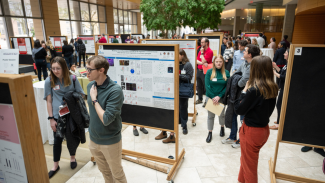
The Wisconsin Alzheimer’s Disease Research Center hosted its annual Alzheimer’s Disease & Related Dementias Research Day on April 17, 2023, at the Discovery Building on the UW–Madison campus and virtually. More than 300 people attended the event in person or online. Research Day was started in 2014 to encourage collaboration and promote scientific thought among faculty, students and researchers from a wide range of disciplines across the UW–Madison campus.
The Research Day poster session included 44 poster presenters. A group of faculty researchers judged the posters. The following is a list of poster abstract award winners:
- Best Fellow, Post Doc, or Research Scientist Poster: Brandon Fico, “The Prevalence and Impact of Vertebral Artery Hypoplasia on Cerebral Hemodynamics”
- Best Graduate Student or Research Specialist Poster: Erica Irizarry-Pagan, “Investigation of neighborhood disadvantage in the context of APOE-associated amyloid onset age risk.”
- Best Undergraduate Student Poster: Douglas Cowman, “Sex Differences in Verbal Memory Decline in Preclinical Alzheimer’s Disease”
This year, two Fan Favorite Presentation awards were given out — one for Fan Favorite Poster Presentation and one for Fan Favorite Lightning Presentation. In-person attendees could vote for their favorite poster presentation during the event. The award winners were:
- Fan Favorite Poster Presentation: Lianlian Du, “A/T/N, cognitive, health and lifestyle differences across white matter hyperintensities groups in aged 45-85 years adults: Results from the Wisconsin Registry for Alzheimer's Prevention (WRAP)”
- Fan Favorite Lightning Presentation: Kaitlyn M. Marino, “Assessing the metabolic response of microglia to amyloid deposition in a mouse model of Alzheimer’s disease”
Presentations
Research day started with a talk from featured speaker Henrik Zetterberg, MD, PhD, from the University of Gothenburg and the University College London, on the latest developments in neurodegenerative disease fluid biomarkers. The UW School of Medicine and Public Health visiting professor emphasized that while cerebrospinal fluid plays a vital role in finding and understanding new biomarkers, blood tests are the future of biomarker research.
New to this year’s event was the Alzheimer’s Association International Conference’s Neuroscience Next conference. Research day served as the kickoff event for the four-day conference, where the AAIC Neuroscience Next ‘One to Watch’ Awards and the Alzheimer’s
Association® Excellence in Neuroscience Mentoring Awards were presented. The following is a list of the six award recipients:
- AAIC Neuroscience Next ‘One to Watch’ Awards: Claire André, PhD, postdoctoral fellow, Center for Advanced Research in Sleep Medicine, Université de Montréal; Chinmayi Balusu, founder, CEO, Simply Neuroscience; Kacie Deters, PhD, assistant professor, University of California, Los Angeles; Kao Lee Yang, MPA/PhD candidate in the Neuroscience and Public Policy Program, University of Wisconsin–Madison
- Alzheimer’s Association® Excellence in Neuroscience Mentoring Awards: Ines Moreno-Gonzalez, PhD, University of Malaga; Edward B. Lee, MD, PhD, University of Pennsylvania
Listen to the ‘One to Watch’ award recipients and the event organizers discuss mentorship and the future of neuroscience research on the Dementia Matters podcast episode, “The Future Of Neuroscience: Early-Career Researchers Named 'One To Watch' By The Alzheimer’s Association.”
Following the poster session, Rush Alzheimer’s Disease Center researcher and Rush Medical College associate professor Crystal Glover, PhD, gave a presentation on incorporating diverse perspectives into aging and Alzheimer’s disease research to support research participants better. Glover highlighted the importance of explaining a study's process, purpose, and outcomes in multiple ways and the language participants feel most comfortable with to ensure they understand and feel engaged with the research.
University of Wisconsin–Madison professor and movement disorders specialist Catherine Gallagher, MD, was the final featured speaker of the event. The ADRC collaborator and researcher gave a talk on Lewy body dementia. Sharing from her research on REM sleep behavior disorders, she described how this disorder could progress to Lewy body dementia and how she’s looking for biomarkers to predict this progression.
Eight abstract submissions to the poster session were chosen for oral abstract presentations. The following is a list of the Lightning Presenters and their abstract titles:
- Karly A. Cody, PhD Student Neuroscience Training Program, Johnson Lab, “Rates of tau PET accumulation along the amyloid timeline in Alzheimer's disease”
- Meghan Haas, MSW, APSW, Gilmore-Bykovskyi Lab, “Brain Health Community Registry: Development and preliminary evaluation of a model for connecting research participants to community-based services and supports”
- Taryn T. James, PhD, Gleason Lab, “Disseminating COVID-19 and Alzheimer's Disease Information to Underrepresented Communities Using Social Media”
- Kaitlyn M. Marino, BS, PhD Candidate Neuroscience Training Program, Tyler Ulland Lab, “Assessing the metabolic response of microglia to amyloid deposition in a mouse model of Alzheimer’s disease”
- Jose L. Martinez, BS, MPA, MS, Bhattacharyya Lab, “A Human Stem Cell Model of Basal Forebrain Cholinergic Neurons”
- Jason F. Moody, PhD, Bendlin Lab, “Staging Neurodegeneration Across the Alzheimer's Disease Continuum”
- Kylie Ruprecht, undergraduate student, Carlsson Lab, “Association of Potential Risk Factors with Cognition and Hippocampal Volume in Veterans”
- Lauren Sarko, PhD Candidate, Cellular and Molecular Pathology, Saha Lab, “CRISPR-Edited, Chimeric Antigen Receptor (CAR) T Cells to Target Senescence in Neurodegeneration”
Photo caption: Guests walk around the 2023 Alzheimer's Disease & Related Disorders Research Day poster session, held in the Discovery Building at UW—Madison



